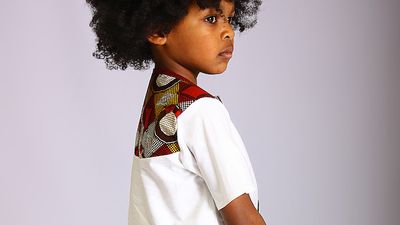Labo Ethnik: An Interview With Guyanese Label Ti Molokoy
Labo Ethnik, a Parisian event which features fashion & interior design, will host Guyanese label Ti Molokoy.
Founded in 2007 by Yvette Taï-Coquillay, Labo Ethnik was created as a way to promote both emerging and established designers from across the globe on the Parisian scene. This year the 8th edition of Labo Ethnik will also welcome interior designers, adding visual arts to the festival’s roster. In the run-up to this year’s installment, starting May 22, we’ll feature some of the designers that’ll be participating in the 2014 edition. Below, we talk with the designer of Guyanese label Ti Molokoy, a brand that blends contemporary designs with ‘Dutch wax prints’ for babies and children.
Poundo for Okayafrica: Who's behind Ti Molokoy?
Sabrina: Ti Molokoy is my daughter, the one I've been hoping to have for a long time, who finally set her roots inside me and was born one day. She's the one who gives me the desire to do what I'm doing today: design for babies and children. Ti Molokoy is a brand that reflects Afro-Caribbean style and aspires to [stand] for tolerance and open minded spirits.
OKA: Where do you come from?
S: I'm from Guyana. But as my parents taught me, we're of African descent. My mixed-backgroung flows in my veins and made me who I am. I am really proud of it. My parents, [who were] born in Guyana, are from diverse cultures: Madagascar, Montserrat.
OKA: How did you start creating? When did you start considering fashion?
S: I started creating in 2011 designing for my daughter, drawing inspiration from pieces that I was seeing in mainstream fashion. Then, a publishing house contacted me because of these creations. They were really impressed by the work and clear fashion signature, stating that it was 'out of the box.' Following this first reaction, I started working on pattern-making that same year. My sewing book with ethnic connotations for children was published in June 2013.
OKA: Did you study fashion?
S: No, I didn't study fashion. I'm a self-taught designer. I've always been full of admiration for my mother: a professional seamstress. However, I would have loved to be trained in a fashion school in order to have a better professional view.
OKA: Why start a children's fashion brand?
S: I have been hoping to have my daughter for such a long time. I had to go through a rough process in order to conceive and bear a child. So, my ready-to-wear pieces and accessories are a tribute to my daughter. It's thanks to her that I had the motivation to start sewing as my mother previously did for me.
OKA: What does this brand represent for you?
S: My background, my story, my life, the apple of my eye: my daughter.
OKA: Where do you seek inspiration? How do you maintain it from collection to collection?
S: Since the birth of my daughter, I had a second to breathe. I went back to [the] sources. First, I stopped straightening my hair and accepted who I am. Living in France, I wish to transmit real values that my parents taught me, including the different cultures I'm from. I draw inspiration from multicultural Guyana, Africa, West Indies and Asia. I constantly reinvent myself by reading, learning and traveling. I do not follow trends, I like to [stand] against fashion seasons.
OKA: What's your fashion signature?
S: I don't know how to describe my signature touch, the one that everyone would recognize and say "This is Ti Molokoy for sure." But I'd say that I have a paired-down style of 'African fabrics' and vibrant colors. It's a change from dark colors. Life is too short to dress sadly and these are things we should teach our children: 'color your life' (laughs).
OKA: What would you recommend to young designers?
S: I think that my brand is still emerging. However, I would recommend them to use and abuse of their creativity, motivation and elbow grease (laughs).I do think that the best to make it is to have knowledge, keep learning!
OKA: Do you think African designers and 'African fashion' should be more present in 'regular' fashion weeks? Is there any discrimination?
S: 'African fashion' has a huge potential in its richness and diversity, which makes it unique. I do think that some established designers should be more exposed during the different fashion weeks. There's still a reluctance when it gets to creations including 'African prints,' but these beliefs are changing. In my mind, I don't think that there is any discrimination. What is known can be put aside. Let's take an example: plastic shoes (which I don't like) became trendy after a celebrity wore them. 'African fashion' was no exception to the rule. It took celebrities wearing these beautiful pieces featuring 'African prints' to get more attention from the general audience. I think that 'African fashion' shouldn't worry, it has a solid future ahead of it.
OKA: What does it mean for you to be part of the Labo Ethnik's 8th edition?
S: I'm really happy to be associated to such a prestigious event. This is definitely a place to be if you want to meet great designers, get advice and objective criticism on your work. Yvette Thai-Coquillay's fashion festival is one of the highlights in Paris. All the fashion lovers of Afro-Caribbean couture can't miss this event.
OKA: What do you expect from the event?
S: Get constructive feedback about my brand. Make myself known to other designers and meet other designers. As a fashion creative, isolation is a danger. You have to get to know other designers in order to create a discussion and confront your ideas.
OKA: Describe Ti Molokoy in one word.
S: Birth gifts, ready-to-wear garments and accessories with an ethnic connotation for babies and children from 0 to 6 months.
OKA: A word about Okayafrica. Okayafrica is ...
S: Cultivating!
